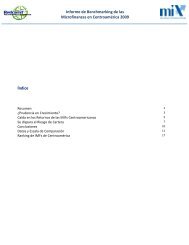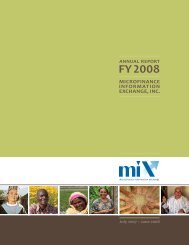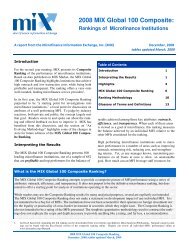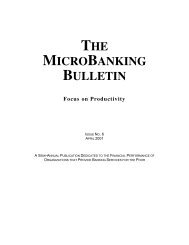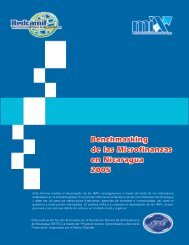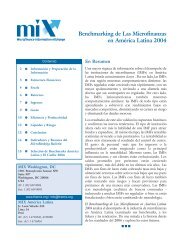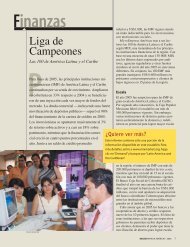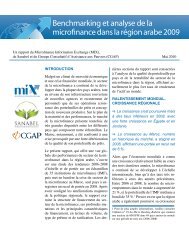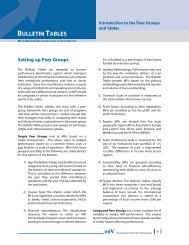APPENDICEScurrent year’s inflation rate, which results in inflationadjustment income, offsetting to some degree theexpense generated by adjusting equity. 16 On thebalance sheet, this inflation adjustment results in areordering of equity accounts: profits areredistributed between real profit and the nominalprofits required to maintain the real value of equity.MFIs that borrow from banks or mobilize savingshave an actual interest expense, which is anoperating cost. In comparison, similar MFIs thatlend only their equity have no interest expense andtherefore have lower operating costs. If an MFIfocuses on sustainability and the maintenance of itscapital/asset ratio, it must increase the size of itsequity in nominal terms to continue to make thesame value of loans in real (inflation-adjusted)terms. Inflation increases the cost of tangible itemsover time, so that a borrower needs more money topurchase them. MFIs that want to maintain theirsupport to clients must therefore offer larger loans.Employees’ salaries go up with inflation, so theaverage loan balance and portfolio must increase tocompensate, assuming no increase in interestmargin. Therefore, a program that funds its loanswith its equity must maintain the real value of thatequity, and pass along the cost of doing so to theclient. This expectation implies MFIs should “pay”interest rates that include the inflation-adjustmentexpense as a cost of funds, even if this cost is notactually paid to anyone outside the institution.Some countries with high or volatile levels ofinflation require businesses to use inflation-basedaccounting on their audited financial statements.We use this same technique in the Bulletin. Ofcourse, we understand that in countries where highor volatile inflation is a new experience, MFIs mayfind it difficult to pass on the full cost of inflation toclients. We are not recommending policy; rather,we are trying to provide a common analyticalframework that compares real financialperformance meaningfully.SubsidiesWe adjust participating organizations’ financialstatements for the effect of subsidies byrepresenting the MFI as it would look on anunsubsidized basis. We do not intend to suggestwhether MFIs should or should not be subsidized.Rather, this adjustment permits the Bulletin to seehow each MFI would look without subsidies forcomparative purposes. Most of the participatingMFIs indicate a desire to grow beyond the16 In fact, an institution that holds fixed assets equal to its equityavoids the cost of inflation that affects MFIs, which hold much oftheir equity in financial form.limitations imposed by subsidized funding. Thesubsidy adjustment permits an MFI to judgewhether it is on track toward such an outcome. Afocus on sustainable expansion suggests thatsubsidies should be used to enhance financialreturns. The subsidy adjustment simply indicatesthe extent to which the subsidy is being passed onto clients through lower interest rates or whether itis building the MFI’s capital base for furtherexpansion.The Bulletin adjusts for three types of subsidies: (1)a cost-of-funds subsidy from loans at below-marketrates, (2) current-year cash donations to fundportfolio and cover expenses, and (3) in-kindsubsidies, such as rent-free office space or theservices of personnel who are not paid by the MFIand thus not reflected on its income statement.Additionally, for multipurpose institutions, TheMicroBanking Bulletin attempts to isolate theperformance of the financial services program,removing the effect of any cross subsidization.The cost-of-funds adjustment reflects the impact ofsoft loans on the financial performance of theinstitution. The Bulletin calculates the differencebetween what the MFI actually paid in interest on itssubsidized liabilities and the deposit rate for eachcountry. 17 This difference represents the value ofthe subsidy, which we treat as an additionalfinancial expense. We apply this subsidy to thoseloans to the MFI that are priced at less than 75percent of prevailing market (deposit) rates. Thedecreased profit is offset by generating an“accumulated subsidy adjustment” account on thebalance sheet.If the MFI passes on the interest rate subsidy to itsclients through a lower final rate of interest, thisadjustment may result in an operating loss. If theMFI does not pass on this subsidy, but instead usesit to increase its equity base, the adjustmentindicates the amount of the institution’s profits thatwere attributable to the subsidy rather thanoperations.Loan Loss ProvisioningFinally, we apply standardized policies for loan lossprovisioning and write-off. MFIs vary tremendously17 Data for shadow interest rates are obtained from line 60l of theInternational Financial Statistics, IMF, various years. Thedeposit rate is used because it is a published benchmark in mostcountries. Sound arguments can be made for use of differentshadow interest rates. NGOs that wish to borrow from bankswould face interest significantly higher than the deposit rate. Alicensed MFI, on the other hand, might mobilize savings at alower financial cost than the deposit rate, but reserverequirements and administrative costs would drive up the actualcost of such liabilities.56 <strong>MICROBANKING</strong> <strong>BULLETIN</strong>, SEPTEMBER 2000
APPENDICESin accounting for loan delinquency. Some count theentire loan balance as overdue the day a paymentis missed. Others do not consider a loan delinquentuntil its full term has expired. Some MFIs write offbad debt within one year of the initial delinquency,while others never write off bad loans, thus carryingforward a hard-core default that they have littlechance of ever recovering.We classify as “at risk” any loan with a paymentover 90 days late. We provision 50 percent of theoutstanding balance for loans between 90 and 180days late, and 100 percent for loans over 180 dayslate. Wherever we have adequate information, weadjust to assure that all loans are fully written offwithin one year of their becoming delinquent.(Note: We apply these provisioning and write-offpolicies for ease of use and uniformity. We do notrecommend that all MFIs use exactly the samepolicies.) In most cases, these adjustments are notvery precise. Nevertheless, most participating MFIshave high-quality loan portfolios, so loan lossprovision expense is not an important contributor totheir overall cost structure. If we felt that a programdid not fairly represent its general level ofdelinquency, and we were unable to adjust itaccordingly, we would simply exclude it from thepeer group.Financial Statement Adjustments and their EffectsAdjustment Effect on Financial Statements Type of Institution Most Affectedby AdjustmentInflation adjustment of equityReclassification of certain long termliabilities into equity, and subsequentinflation adjustmentSubsidy adjustment: Interest savingson subsidized liabilities involving atleast a 25 percent discount in relationto market based loans to the sameinstitution or, in the absence of suchloans, the deposit rateSubsidy adjustment: Current-yearcash donations to cover operatingexpensesSubsidy adjustment: In kind donationof goods or services (e.g., line staffpaid for by technical assistanceproviders)Loan loss provision and write-offadjustment: Applying policies whichmay be more aggressive than the MFIemploys on its own booksIncreases financial expense accountson profit and loss statement, to somedegree offset by inflation incomeaccount for revaluation of fixed assets.Generates inflation adjustment accountin equity section of balance sheet withnet balance of inflation adjustments.Decreases concessionary loan accountand increases equity account;increases inflation adjustment on profitand loss statement and balance sheet.Increases financial expense on profitand loss statement. Increases subsidyadjustment account on balance sheet.Reduces operating income on profit andloss statement (if the MFI recordsdonations as operating income).Increases subsidy adjustment accounton balance sheet.Increases expense on profit and lossstatement, increases subsidyadjustment account on balance sheet.Increases loan loss provision expenseon profit and loss statement. Onbalance sheet, increases in loan lossreserve and/or write-offs are accountedfor by equal reductions in loan lossreserve and portfolio.NGOs funded more by equity thanby liabilities will be hard hit,especially in high-inflationcountries.NGOs that have long-term lowinterest“loans” from internationalagencies that function more asdonations than loans.Banks or NGOs that use large linesof credit from governments orinternational agencies at highlysubsidized rates.NGOs during their start-up phase.This adjustment is relatively lessimportant for mature institutionsincluded in this edition.NGOs during their start-up phase.Less important for matureinstitutions included in this edition.MFIs that allow bad loans toaccumulate within their portfolio.This common problem tends tohave a limited effect on leadingMFIs because their loan losses arelow, even after adjustment.<strong>MICROBANKING</strong> <strong>BULLETIN</strong>, SEPTEMBER 2000 57



